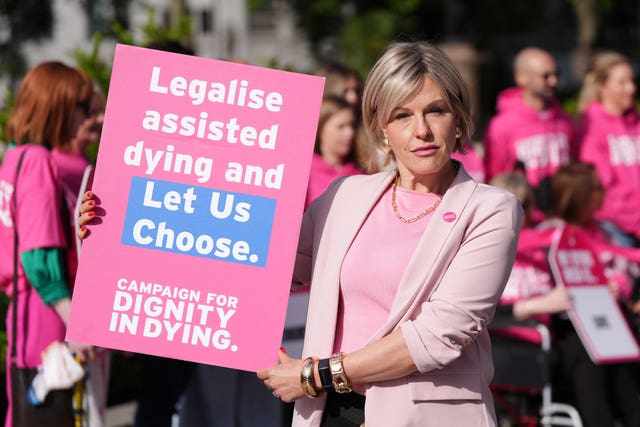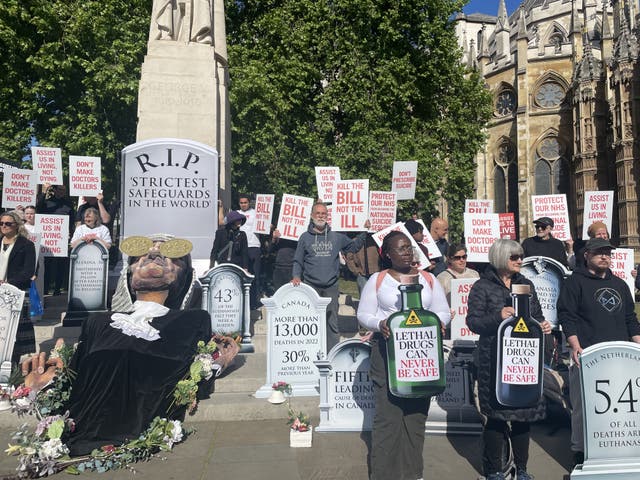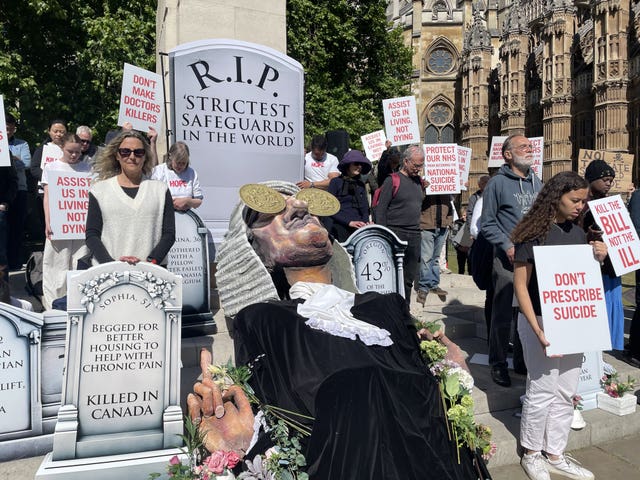Dame Esther Rantzen ‘terrified’ her family could be traumatised by her death
Her daughter Rebecca Wilcox joined demonstrators who gathered outside Parliament on Friday.

Dame Esther Rantzen is “terrified” her family’s memories of her will be tainted if she suffers a “traumatic death”, her daughter has said.
Rebecca Wilcox, the daughter of the terminally-ill broadcaster and Childline founder, was among demonstrators who gathered outside Parliament on Friday morning ahead of a debate on the Terminally Ill Adults (End of Life) Bill.
Campaigners from both sides of the debate were present, with those opposing the law change holding placards reading “assist us in living not dying” and “kill the Bill not the ill”, while posters held by supporters of the Bill included slogans such as “my dying wish is autonomy” and “my dying wish is humanity”.
Speaking to the PA news agency, Ms Wilcox said of her mother: “She believes in compassion and kindness, she has campaigned for that in various forms.

“She’s campaigned for that for children, she’s campaigned for that for old people – now this campaign is about the end of our lives.”
Ms Wilcox said she was fearful her mother, who has cancer, would have a “traumatic death”, adding: “I don’t want to witness that, she doesn’t want us to witness that.
“She’s terrified that our memories of her – and they are such good memories – will be destroyed by a bad death, and so she’s asking for choice for everybody.
“Unfortunately, it won’t be in time for her.”
In a statement, Dame Esther urged MPs to support the Bill and said: “All we terminally-ill adults ask of our MPs is to remember how much suffering our current messy cruel criminal law creates.
“How many lonely painful deaths. How many suicides. How many agonising memories have been created by it.
“We all hope for a good, pain-free death for ourselves and those we love and care for.

“Please vote for this crucial reform, as so many other countries have, not for me and for those like me who are running rapidly out of time, but for future generations to have the right, if necessary, not to shorten their lives, to shorten their deaths.”
Dame Esther also suggested many MPs opposed to the Bill have “undeclared personal religious beliefs which mean no precautions would satisfy them”, but Labour’s Jess Asato criticised her comments as “distasteful and disrespectful”.
Baroness Ilora Finlay, who sits in the House of Lords and is a former palliative medicine consultant, said amendments proposed to the Bill felt like a “muddle and a mess”.
She said: “It feels really dangerous because there are loopholes in it, things which have not been thought through.
“I know there are amendments down to try to address some of those, but we don’t know whether they will be taken in the Commons procedure and I think it could potentially fundamentally change the whole role of doctors towards their patients in a very adverse way, and actually it won’t solve the problem of people having bad deaths.”
She added: “The test for mental capacity is tremendously inadequate, because you need to have capacity for the decision you’re taking, not just overall, for other decisions in life, like where you’re going or what you’re wearing or what you’re eating.
“This is an enormous decision and, importantly, the most difficult time for people is at the time that they get a devastating diagnosis and they need support, and they need clinicians who can communicate well with them.
“This Bill addresses nothing like that.”
Instead of assisted dying, Baroness Finlay said that improvements need to be made to palliative care.

“We need to improve care everywhere for everyone who’s terminally ill and who’s facing difficult times, and we can do that much more cost effectively,” she added.
Gordon Macdonald, chief executive of Care Not Killing, said assisted dying was “really dangerous”.
“People are not articulate, people are not used to making decisions for themselves,” he said.
“Once you put assisted suicide or euthanasia into medicine, which is what’s being proposed, there are lots and lots of vulnerable people at a huge risk of pressure or abuse, perhaps, by partners or, alternatively, just feeling a burden. ”
Those opposing the Bill were joined by actor and disability campaigner Liz Carr.
The Terminally Ill Adults (End of Life) Bill is currently at report stage – where MPs will debate and vote on various amendments.
It is the first time the Bill is returning to the Commons since it passed second reading in a historic vote in November, when MPs supported it by a majority of 55.





